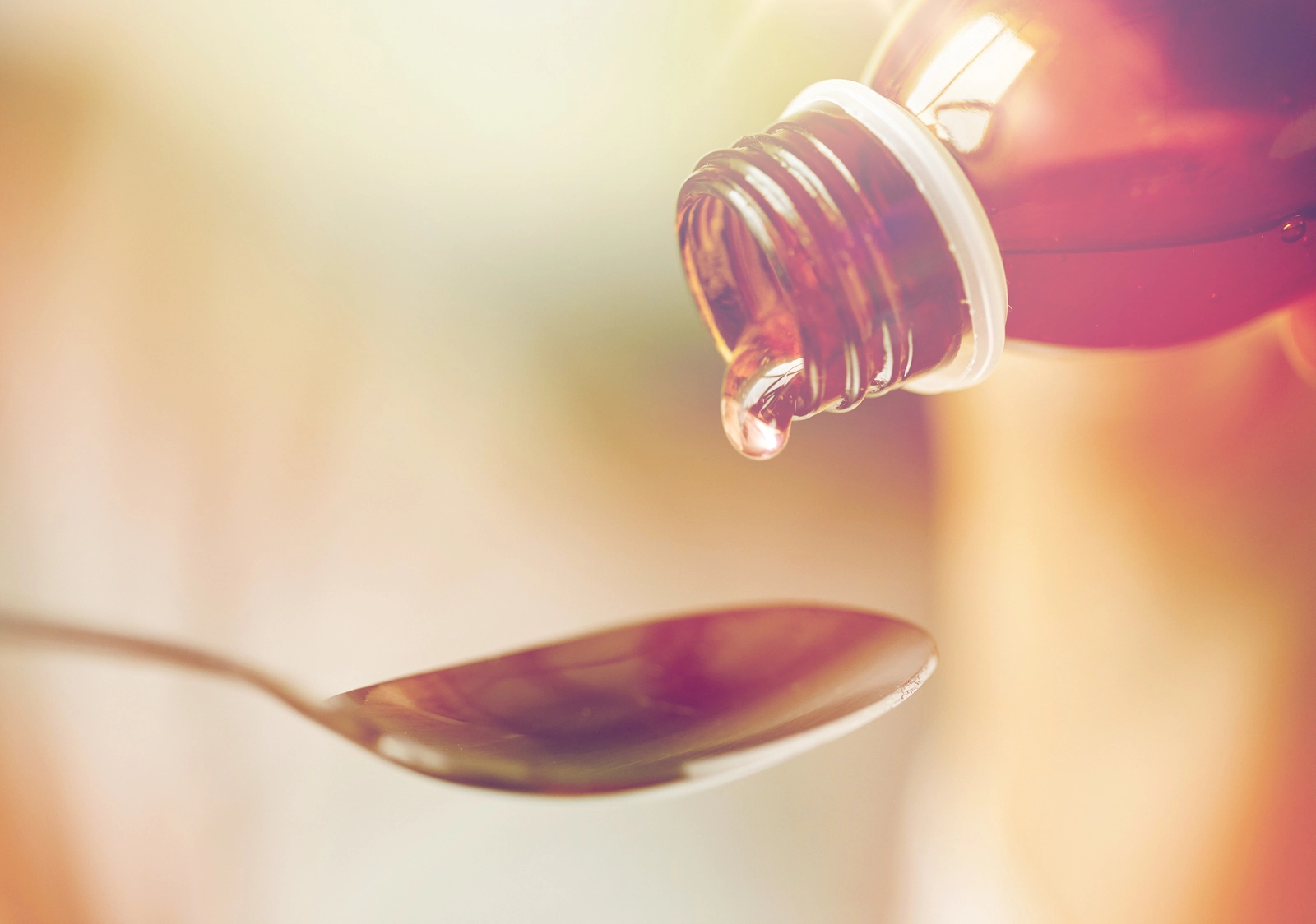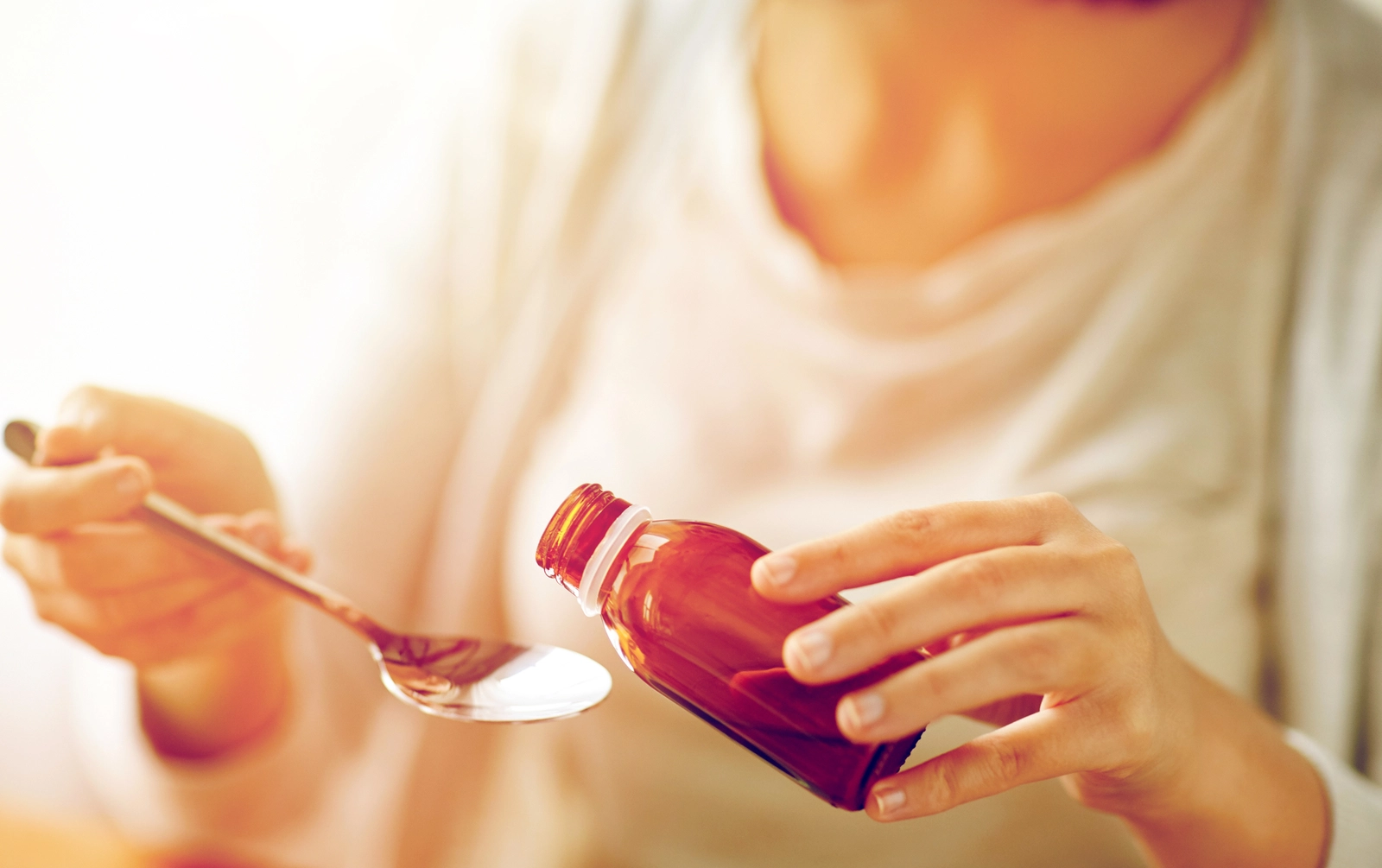How Long Does NyQuil Last? Drug Duration and Risks

What you will learn
- NyQuil is a widely available cold and flu medication available over the counter.
- NyQuil’s effects can begin 30 minutes after taking it and can last up to 6 hours.
- NyQuil has several ingredients, including cough suppressants, pain relievers, and antihistamines.
- Though considered safe, NyQuil can be habit-forming.
NyQuil is an over-the-counter (OTC) medication that can be used to treat the symptoms of cold, flu, or conditions that have symptoms like coughing, sneezing, nasal congestion, and discomfort. It’s designed to relieve these symptoms and help you get a good night’s sleep, lasting up to 6 hours.[1]
Though NyQuil is generally safe, it can be habit-forming and may lead to dependence. Learn more about NyQuil’s effects, duration, and risks.
What Is NyQuil?
NyQuil is the brand name for an OTC medication used to treat the symptoms of cold, flu, and other respiratory conditions. It’s designed to help sleep and comes in syrup and liquid cap forms.
NyQuil also contains ingredients that treat cold and flu symptoms, such as pain relievers like acetaminophen, cough suppressants like dextromethorphan, and antihistamines like doxylamine succinate.
How Does NyQuil Work?
NyQuil has a combination of ingredients that can treat the symptoms of respiratory conditions, such as antihistamines and cough suppressants. Together, these ingredients relieve symptoms and help you to sleep through the night.
Part of a similar brand, NyQuil is the nighttime component of DayQuil, a similar medication intended to relieve symptoms during the day and keep you alert. It contains many of the same ingredients, including acetaminophen and dextromethorphan, but it lacks the antihistamines that cause drowsiness.
How Long Does NyQuil Last?
The effects of NyQuil typically work within 30 minutes of the last dose. It provides symptom relief for 4 to 6 hours, often enough to sleep through the night with a cold or flu.
Though the timeframe for NyQuil is 4 to 6 hours, it can vary by several factors. If you have a slower metabolism, it may take longer for NyQuil to eliminate from your body. People with faster metabolisms may find that NyQuil doesn’t last quite as long.
Recommended NyQuil Dosage
Follow the dosage on your NyQuil product label or your doctor to ensure that you’re taking a safe dosage of NyQuil. However, the standard dosages of Nyquil are:[3]
- NyQuil syrup form: 30 ml or 2 tbsp every 6 hours
- NyQuil liquid caps: 2 capsules by mouth every 6 hours
While NyQuil is accessible and widely available at pharmacies and drug stores, it’s important to be cautious with dosing and interactions. Just because it’s OTC doesn’t mean that it doesn’t have risks, and overdose is possible if you take too much NyQuil. Generally, more than 4 doses of NyQuil in 24 hours is dangerous.
NyQuil Side Effects and Risks

The side effects of NyQuil are typically mild but may include:[4]
- Drowsiness
- Sedation
- Lightheadedness
- Upset stomach
- Nausea
- Blurred vision
- Dry mouth
- Difficulty urinating
You should never drink alcohol while taking NyQuil. These two drugs take a toll on the liver and cause drowsiness, so combining them can lead to severe sedation and may impair your coordination. Don’t drive or engage in other activities requiring alertness while taking NyQuil.
NyQuil can be dangerous if you have certain medical conditions, including:[5]
- Liver or kidney disorders
- Diabetes
- High blood pressure
- Thyroid disorders
- Asthma
- Glaucoma
- Prostate enlargement
NyQuil can interact with different medications, including tranquilizers, sedatives, flu medications, cold medications, and monoamine oxidase (MAO) inhibitors, a type of antidepressant. Combining NyQuil with antidepressants can increase the risk of serotonin syndrome, a dangerous condition that occurs when there’s a buildup of serotonin in the body. It includes symptoms like increased body temperature, nausea, vomiting, and hallucinations.[6]
Can You Overdose on NyQuil?
Yes, you can overdose on NyQuil if you take too much or combine it with other drugs. Taking high doses of NyQuil can cause difficulty breathing, confusion, and severe drowsiness that can be dangerous.
If you suspect someone is experiencing a NyQuil overdose, get medical attention as soon as possible or call 911. Getting medical care as soon as possible is important to avoid complications.
Is NyQuil Addictive?
NyQuil isn’t addictive like some other drugs. Generally, if you use NyQuil according to the package directions, you’re unlikely to develop an addiction. However, misusing NyQuil can cause dependence, which is when the body gets used to the presence of a drug and needs it to function. If you take or misuse it regularly and stop taking it suddenly, withdrawal can occur, leading to symptoms like cravings, anxiety, stomach pain, and rebound insomnia.
Misuse of NyQuil includes taking too much to enhance its sedative effects or taking it to treat conditions that it’s not intended to treat, such as chronic bronchitis or asthma. NyQuil is a short-term treatment for cold and flu symptoms, such as sore throat, body aches, or runny nose.
NyQuil may be misused as a sleep aid because of its sedative effects. NyQuil can cause drowsiness that helps you sleep, which is why it’s used as a nighttime cold medicine, but it’s not intended – or recommended – to use it on its own to sleep. Taking NyQuil as a sleep aid makes you more likely to become dependent on it.
Dextromethorphan Addiction
Taking NyQuil in high or frequent doses to achieve euphoria is often attributed to dextromethorphan, one of NyQuil’s active ingredients. In low doses, dextromethorphan works as a cough suppressant. In higher doses, it can affect the brain, leading to euphoria or hallucinations. Some young people misuse NyQuil to get high instead of using recreational drugs.
Misusing Nyquil for the dextromethorphan can carry significant risks and mimics the effects of PCP, a dangerous hallucinogen.[7] Dextromethorphan can impair coordination and judgment, especially if it’s combined with drugs like acetaminophen, alcohol, or antidepressants. Risks include heart attack, liver damage, seizures, and death.
Treatment for NyQuil Addiction
NyQuil may not be associated with addictions like opioids or alcohol, but it’s still uncomfortable and difficult to overcome. Withdrawal symptoms can make it difficult to stop taking NyQuil, especially if you’re misusing it as a sleep aid. This can lead to relapse and continue the cycle of addiction.
If you’re struggling with NyQuil misuse or addiction, you can get help. Medical detox may be recommended to help with withdrawal symptoms and insomnia, ensuring you don’t relapse. Depending on the severity of your NyQuil addiction, you may need an addiction treatment program to manage the underlying factors of NyQuil misuse and abuse.
Seek Help for NyQuil Misuse and Addiction
NyQuil is widely available and generally safe when used for cold and flu symptoms, but misuse or abuse can increase the risk of adverse effects. If you struggle with NyQuil misuse or abuse, it’s important to get help as soon as possible to address your addiction and learn healthier habits.
Ready to get help for you or a loved one? Contact us
To ensure accuracy and quality, every contributor to the Alpas Wellness resource library undergoes a thorough evaluation of their experience, credentials, and achievements prior to publication.
Frequently Asked Questions About NyQuil
How Long Does NyQuil Take to Wear Off?
NyQuil’s effects last about 6 hours after your last dose. However, some people may experience shorter or longer duration of effects. You can take another dose after 6 hours if needed.
Can I Take NyQuil to Sleep?
NyQuil can help with sleep when you have flu or cold symptoms that keep you up, such as cough, runny nose, sore throat, or congestion. However, it’s not a sleep aid by itself and shouldn’t be used as a treatment for insomnia. It’s only intended for short-term use for cold or flu symptoms, not long-term use.
Does NyQuil Make It Difficult to Wake Up?
NyQuil is intended to be taken at night to help you sleep when you have a cold or flu. One of the drug’s effects is drowsiness, which can make it difficult to wake up alert. It’s possible to experience daytime drowsiness after taking nyQuil as well.
Can I Drive After Taking NyQuil?
The effects of NyQuil last about 6 hours, but the drowsiness can stick around for much longer. Avoid driving or engaging in other activities that can be dangerous if you’re not alert until the effects of NyQuil wear off.
[1,2] How long does Nyquil last?. Drugs.com. (n.d.-g). Retrieved from https://www.drugs.com/medical-answers/long-nyquil-3566188/ on 2024, September 20.
[3] National Institutes of Health. (n.d.). DailyMed – Vicks nyquil cold and flu- acetaminophen, dextromethorphan hydrobromide, and doxylamine succinate capsule, liquid filled. U.S. National Library of Medicine. Retrieved from https://dailymed.nlm.nih.gov/dailymed/lookup.cfm?setid=620bc3dc-099b-40bd-be22-e4c3f9c8e09d on 2024, September 20.
[4,5] Nyquil cold and flu uses, Side Effects & Warnings. Drugs.com. (n.d.-k). Retrieved from https://www.drugs.com/mtm/nyquil-cold-and-flu.html#side-effects on 2024, September 20.
[6] Mayo Foundation for Medical Education and Research. (n.d.). Serotonin syndrome. Mayo Clinic. Retrieved from https://www.mayoclinic.org/diseases-conditions/serotonin-syndrome/symptoms-causes/syc-20354758 on 2024, September 20.
[7] Martinak, B., Bolis, R. A., Black, J. R., Fargason, R. E., & Birur, B. (2017, September 15). Dextromethorphan in cough syrup: The poor man’s psychosis. Psychopharmacology bulletin. Retrieved from https://www.ncbi.nlm.nih.gov/pmc/articles/PMC5601090/ on 2024, September 20.